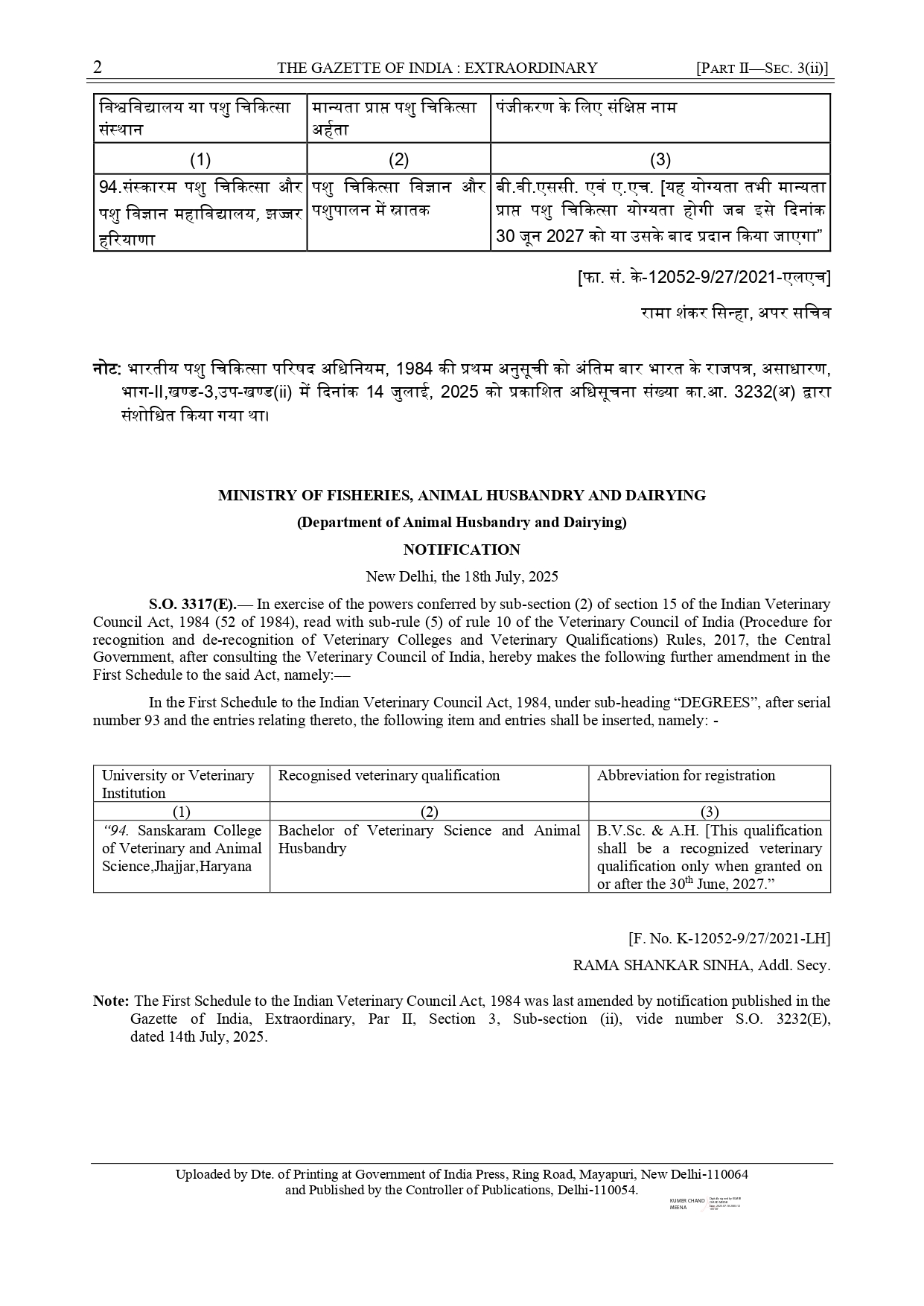Agri-Entrepreneurship: Bridging the Gap Between Research and Market–Empowering Youth at Sanskaram University
04 Oct, 2024
Dr Kunal Narwal (Assistant Professor)
In an era where innovation and sustainability are key to the future of agriculture, fostering an entrepreneurial mindset among the youth has become a critical priority. Agri-entrepreneurship, which combines agricultural knowledge with business acumen, serves as a bridge between research and the market. In this regard, Sanskaram University plays a vital role in driving motivation among students to undertake entrepreneurship, offering them the tools, guidance, and support needed to turn their ideas into successful ventures.
Agri-Entrepreneurship: A Catalyst for Change
Agri-entrepreneurship is the practice of applying entrepreneurial principles to the agricultural sector. This concept goes beyond traditional farming, extending to areas such as agribusiness, agri-tech, food processing, and supply chain management. It involves identifying challenges within the agricultural ecosystem and using innovative solutions to create profitable businesses that address these issues.
Our university recognizes the importance of preparing students not just as agricultural experts but as entrepreneurs who can harness their knowledge and create impact-driven solutions. By bridging the gap between research and the marketplace, the university ensures that students are well-equipped to lead in the agri-business landscape.
Key Initiatives at Our University to Foster Agri-Entrepreneurship
- Entrepreneurship Development Programs: The university offers structured programs specifically designed to develop an entrepreneurial mindset in students. These programs provide essential business skills such as financial planning, marketing strategies, supply chain management, and understanding the regulatory environment of agriculture.
- Research to Market Translation: Our university encourages students to view their academic research as a stepping stone to creating marketable solutions. Whether it’s developing climate-resilient crops, eco-friendly farming tools, or innovative food products, students are motivated to think about how their research can solve real-world agricultural problems and meet market demands.
- Agri-Business Incubation Centers: Through incubation centers, students with innovative ideas receive mentorship, funding opportunities, and access to industry networks. These incubation centers serve as platforms where aspiring agri-entrepreneurs can develop prototypes, validate their ideas, and eventually scale their businesses.
- Industry Collaborations: The university actively collaborates with agri-tech companies, agribusinesses, and government agencies to provide students with exposure to the market. These partnerships facilitate internships, live projects, and job opportunities, helping students understand the commercial aspects of agriculture and how research can be transformed into profitable ventures.
- Entrepreneurial Competitions and Hackathons: To ignite creative thinking, the university organizes competitions that challenge students to come up with innovative solutions to agricultural problems. These competitions offer not only cash prizes but also opportunities for further development of their ideas through incubators and accelerators.
Driving Youth Motivation Towards Entrepreneurship
The university believes in inspiring students to become job creators rather than job seekers. The following initiatives and values have been instrumental in motivating youth towards entrepreneurship:
- Mentorship and Guidance: One of the key drivers of motivation is the mentorship students receive from successful agri-entrepreneurs and industry experts. Through regular guest lectures, interactive workshops, and one-on-one mentoring sessions, students gain valuable insights and encouragement to pursue entrepreneurial ventures.
- Practical Exposure: The university emphasizes experiential learning, where students are exposed to real-world agricultural challenges through fieldwork, industry visits, and collaboration with farmers. This practical exposure gives them the confidence to apply their knowledge and innovate within the agricultural domain.
- Creating a Supportive Ecosystem: From faculty support to peer collaboration, the university fosters an ecosystem where entrepreneurial ideas can flourish. Students are encouraged to take risks, learn from failures, and continuously iterate on their ideas. This support instills a sense of ownership and responsibility, motivating them to turn their ideas into successful agri-businesses.
- Financial and Infrastructural Support: Access to seed funding, grants, and state-of-the-art research labs allows students to take their ideas forward. The university provides the necessary financial backing and infrastructural support, reducing the risks associated with starting a business and giving students the confidence to pursue entrepreneurship.
Impact on Students and the Agricultural Sector
The university’s efforts to promote agri-entrepreneurship have had a significant impact on students and the broader agricultural sector:
- Empowering Students as Future Leaders: Students leave the university equipped with not only agricultural knowledge but also the entrepreneurial skills needed to start their own businesses. This empowerment fosters self-reliance, leadership, and the ability to create meaningful change in the agriculture industry.
- Job Creation and Rural Development: As graduates launch their own agri-based start-ups, they create job opportunities and contribute to rural development. These ventures improve local economies, bring technological advancements to farming communities, and promote sustainable agricultural practices.
- Innovation in Agriculture: The university’s focus on agri-entrepreneurship has led to several innovative solutions in agriculture. Students are developing technologies that improve crop yields, enhance resource efficiency, and create value-added products. These innovations contribute to addressing food security, environmental challenges, and market inefficiencies.
The Future of Agri-Entrepreneurship at Our University
Looking ahead, the university aims to further strengthen its commitment to fostering agri-entrepreneurship. Plans are in place to expand incubation facilities, deepen industry partnerships, and introduce new courses focused on emerging trends such as precision farming, agri-tech, and sustainable agriculture.
By continuing to bridge the gap between research and the market, the university will not only shape the future of agricultural education but also drive innovation and entrepreneurship that benefits society as a whole.
Agri-entrepreneurship at our university is more than just a course of study—it’s a movement that empowers students to transform their research into impactful businesses. By fostering a culture of innovation, providing hands-on experiences, and offering the support necessary to turn ideas into reality, the university is shaping the future of agriculture and creating the next generation of agri-entrepreneurs. Through this approach, students are motivated to become changemakers, driving agricultural growth and contributing to sustainable development globally.





 VIEW
VIEW















